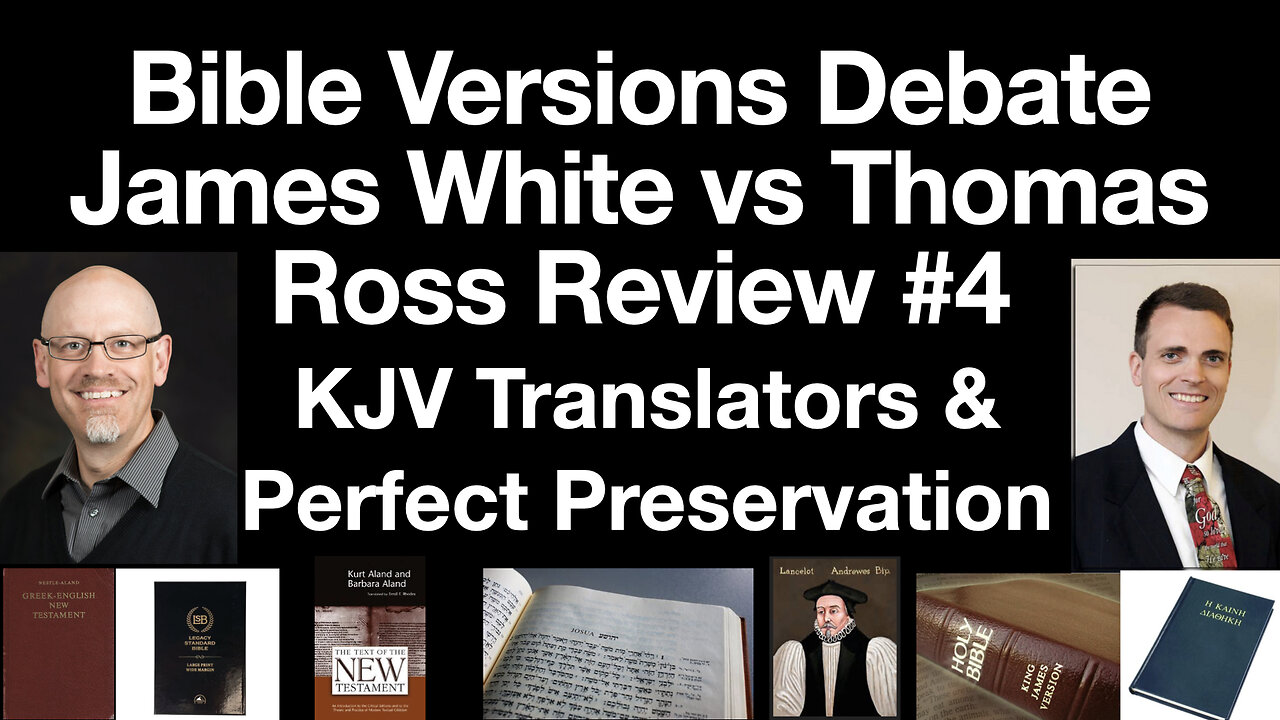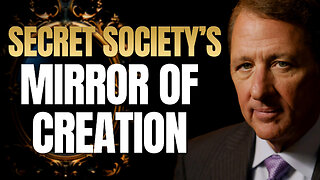Premium Only Content

James White & Thomas Ross Debate Review #4: KJV Translators to the Reader & Perfect Preservation
James White and Thomas Ross debated: “The Legacy Standard Bible (LSB), as a representative of modern English translations based upon the UBS/NA text (the Greek New Testament printed by the United Bible Society, which is also the text of the Nestle-Aland), is superior to the KJV (King James Version), as a representative of TR-based (Textus Receptus or Received Text based) Bible translations.” This King James Only or King James Version Only (KJVO) or Confessional Bibliology debate took place on February 18, 2023.
This video is part four of a series of debate review videos by Thomas Ross of the arguments made by both sides of the debate. James White's first argument in this King James Only debate was that (if they were alive today) the King James Version translators would prefer the Legacy Standard Bible to the King James Bible. In both the live debate and his book The King James Only Controversy, James White claimed that the "Translators to the Reader" prefatory material in the KJV proved that the KJV translators would prefer modern Bible versions based on the Nestle-Aland Textus Rejectus to their own translation based on the Textus Receptus.
The last video examined the Epistle Dedicatory of the KJV. “The Translators to the Reader” now comes under examination. This is the only material that James White references in The King James Only Controversy. No written material by Dr. White qualifies his astonishing claim that the KJV translators would prefer modern Textus Rejectus-based modern versions to their own translation by admitting that the KJV translators claimed that their version was better than all other English versions in the Epistle Dedicatory. James White has never acknowledged this fact in any of his written material, his KJV debates, his KJV interviews, or (to Thomas Ross' knowledge) his Dividing Line programs. It is completely unacknowledged in his published writings and in his KJV debates.
So does the Translators to the Reader section contradict the claims in the Epistle Dedicatory? Does the Translators to the Reader section say something like: “It doesn’t matter what Greek text the Bible is translated from; it is great if in a church service if twenty people they have twenty different Bible versions, some literal, some non-literal, with different verses included and excluded and different doctrines taught or not taught in passages from Mark 16:9-20 to 1 Timothy 3:16 to the Model Prayer in Matthew 6 and Luke 11”? No-certainly not!
The Translators to the Reader section of the KJV introductory material makes statements about the inspiration and preservation of Scripture that are consistent with the Bibliology of verbal, plenary inspiration and preservation of the KJV-only and Confessional Bibliology movements, but are not consistent with the anti-inspiration and anti-preservation views that brought us the Nestle-Aland Greek text.
The KJV translators viewed the Scriptures that were available to them, in their hands to study and to use, as “perfect,” indeed, “so full and so perfect.” That is, the perfection of Scripture was not limited to long-lost autographs, but the texts that they themselves could love and reverently obey, the available texts of Scripture, were “perfect.” Being “perfect” is A PRESENT QUALITY of Scripture—what was AVAILABLE AND IN USE was “perfect.” What was “so perfect” was the AVAILABLE text that they were to study themselves, and which past ages had studied—the available, in-use text was perfect, according to the KJV translators. This is a statement of the preservation of Scripture that would delight Christians who are KJV-only or who support Confessional Bibliology but would not be especially appreciated by very large percentages of advocates of modern versions.
The preface to the KJV also specifies that John 5:39 in the KJV, an important doctrinal text, correctly contains the imperative "search" the Scriptures rather than (as in the LSB, NIV, NKJV, NASB, ESV, NRSV) the indicative "You search."
In summary, the KJV translators affirm the verbal, plenary inspiration and preservation of Scripture—the Bibliology of King James Onlyism and of Confessional Bibliology, rejected by the system of belief that gave us the modern Nestle-Aland Greek text and the English versions based upon it. Believing Scripture on its own inspiration and preservation leads by good and necessary consequence to the superiority of the Textus Receptus to the modern Nestle-Aland text. The “Translators to the Reader” also favors English translational choices in passages such as John 5:39 that are supported by the context and are found in other Reformation-era Bibles but are rejected by modern English versions. Thus, the KJV translators would favor their own translational choices, also found in other Reformation-era Bibles, to translational choices found in modern English versions. The KJV translators would view their original language base and translational choices as superior to those of modern versions.
-
 LIVE
LIVE
GritsGG
6 hours ago#1 Most Warzone Wins 4049+!
68 watching -
 3:36:14
3:36:14
Nerdrotic
5 hours ago $39.65 earnedWB Sale is Hollywood's DOOM! | Stranger Things REVIEW | BBC Get's F*%#@! - Friday Night Tights 382
165K12 -
 20:17
20:17
Stephen Gardner
4 hours agoAlex Jones WARNS Trump of Soros funded Coup!
16K62 -
 1:39:07
1:39:07
vivafrei
5 hours agoWhy Was He Here? Biden Cover-Up of Assault by Afghan Refugees? When Satire Meets Reality & MORE!
19.7K26 -
 LIVE
LIVE
LFA TV
22 hours agoLIVE & BREAKING NEWS! | FRIDAY 11/28/25
1,101 watching -
 LIVE
LIVE
Edge of Wonder
2 hours agoSpiritual Awakenings to Prophetic Dreams & Transformation: Sherri Divband Interview
183 watching -
 LIVE
LIVE
The Mike Schwartz Show
4 hours agoTHE MIKE SCHWARTZ SHOW Evening Edition 11-28-2025
37 watching -
 1:05:35
1:05:35
Russell Brand
6 hours agoMAHA Summit: Comedy, Controversy & Clarity - SF656
74.2K29 -
 49:45
49:45
Liberty Hangout
2 days agoThe Left HATES America and Can't Change My Mind!
87.2K106 -
 23:42
23:42
The Kevin Trudeau Show Limitless
2 days agoThe Brotherhood’s Ancient Mirror Code Revealed
40.5K16